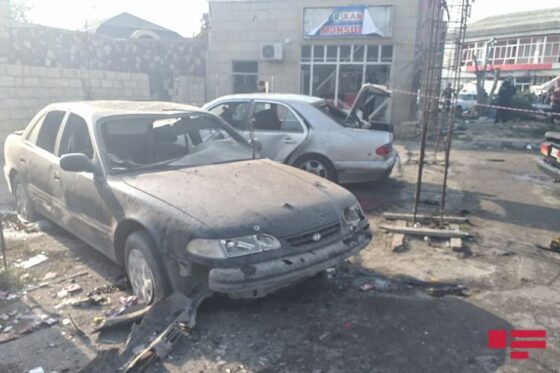
Amnesty International has verified the use of banned cluster bombs by Armenia for the first time in the current Nagorno-Karabakh conflict, following an attack on the city of Barda in Azerbaijan.
Yesterday (28 October 2020), at approximately 1.30pm local time, one or several Smerch rockets were fired into Barda, striking a residential neighbourhood close to a hospital. The Azerbaijani Prosecutor General’s Office has stated that at least 21 people were killed, with an estimated 70 more injured.
Amnesty International’s Crisis Response experts verified pictures (taken by Vice News reporters in the city) of fragments of 9N235 cluster munitions from Russian-made 9M55 Smerch rockets, that appear to have been fired into the city by Armenian forces.
“The firing of cluster munitions into civilian areas is cruel and reckless, and causes untold death, injury and misery,” said Marie Struthers, Amnesty International’s Regional Director for Eastern Europe and Central Asia.
Cluster munitions are inherently indiscriminate weapons that inflict suffering for civilian populations years after their use, and are internationally banned by a treaty backed by more than 100 states. Amnesty International is calling on both Armenia and Azerbaijan to become parties to the Convention on Cluster Munitions.
Cluster munitions scatter hundreds of bomblets, or submunitions, over a wide area. It is estimated that between 5 and 20 per cent of cluster bomblets fail to explode. They are then left behind, posing a threat to civilians similar to that of anti-personnel landmines.
The use of these weapons violates the prohibition of indiscriminate attack because of the wide area covered by the numerous bomblets released, and the danger posed to all who come into contact with the unexploded munitions.
On October 28th, at around 1 pm, the hostile armed forces using cluster bombs prohibited by international law launched missile attacks at densely populated areas of Barda district.
21 civilians were killed and over 70 civilians were wounded. Civil infrastructure facilities and vehicles were extensively damaged.
International organisations have condemned Armenia’s use of banned weapons against civilians in multiple densely populated cities of Azerbaijan.
Nagorno-Karabakh is part of Azerbaijan, but has been occupied by Armenia since 1990s along with another 7 districts of Azerbaijan.
Armenia has so far refused to comply with the UN Security Council, the UN General Assembly and other organisations’s resolutions and calls for immediate and complete withdrawal from the occupied territories.
The latest outbreak began on September 27 and involved heavy artillery, missiles and drones after Armenia-controlled armed separatists launched an unprovoked attack on Azerbaijan .
